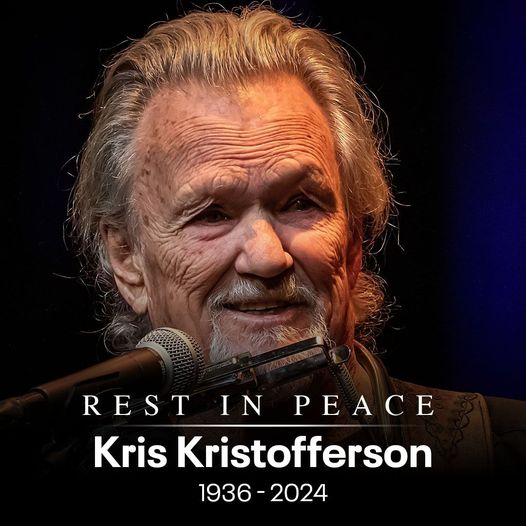Kris Kristofferson, a legendary figure in both music and film, passed away peacefully at his home in Maui, Hawaii, on September 28, surrounded by his family. Born on June 22, 1936, in Brownsville, Texas, Kristofferson’s life was filled with memorable music, iconic roles, and passionate activism. Over the course of his 88 years, he shaped the world of country music and Hollywood with his raw talent, remarkable storytelling, and unwavering commitment to his craft.
The Early Years: Born to a Military Family
Kris Kristofferson was born into a military household, with his father serving as a major general in the U.S. Air Force. Growing up in Brownsville, Texas, Kristofferson’s early life was disciplined yet creatively rich. At the age of 11, he penned his first song, humorously titled “I Hate Your Ugly Face.” His passion for creativity was evident even as a child and continued throughout his education.
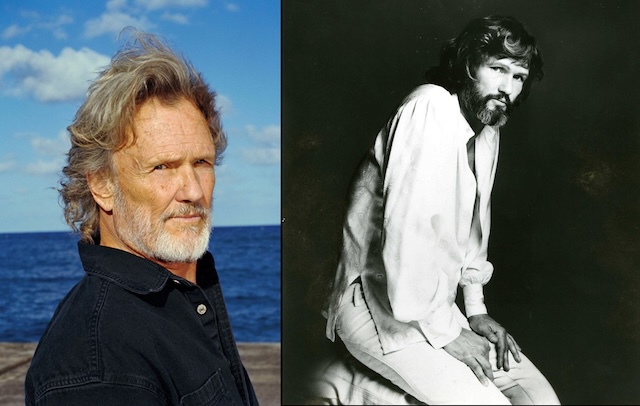
Discovering His Passion for Writing
Kristofferson’s love for writing led him to major in creative literature at Pomona College in California. His diverse range of talents—ranging from playing rugby and varsity football to boxing in the Golden Gloves—earned him a feature in Sports Illustrated’s “Faces in the Crowd” in 1954. He was more than just an athlete; he was an accomplished folk singer and an award-winning writer. His passion for literature took him to Oxford University as a Rhodes Scholar, where he immersed himself in the works of William Blake and Shakespeare. Blake’s teachings inspired him deeply, planting the idea that it was his moral duty to pursue his creative calling, lest he face regret for eternity.

From the Army to Music City
After Oxford, Kristofferson joined the U.S. Army, where he became a helicopter pilot and reached the rank of Captain. Assigned to teach literature at West Point, he realized his true calling lay elsewhere. Driven by a passion for songwriting, he made the bold decision to leave the military and move to Nashville. This move came at a high personal cost—his family disowned him, believing that he had lost his way. But Kristofferson found the decision liberating, as he embraced his new path with nothing left to lose.
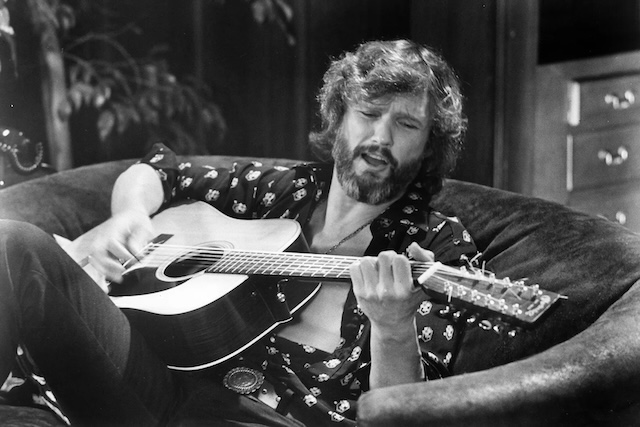
From Janitor to Songwriting Success
In 1965, Kristofferson arrived in Nashville with nothing but determination. He took a job as a janitor at Columbia Studios, sweeping floors while writing songs on the side. Despite the challenges, Kristofferson compared the creative energy of Nashville in the 1960s to that of Paris in the 1920s. The stories from this period are legendary—none more so than the tale of him landing a helicopter in Johnny Cash’s yard to get his songs noticed. Cash became a crucial supporter, helping Kristofferson gain exposure by inviting him to perform at the Newport Folk Festival and on his television show.

Crafting Stories Through Song
Kris Kristofferson’s songwriting was unlike anything Nashville had seen before. His songs, filled with vivid imagery and raw emotion, read like beautifully written short stories. “Sunday Morning Coming Down,” with its vivid depiction of hungover loneliness, became an anthem of authenticity in country music. Kristofferson’s ability to sustain a narrative within his lyrics elevated him above many of his contemporaries, inspiring a wave of young songwriters to move to Nashville in pursuit of similar success.
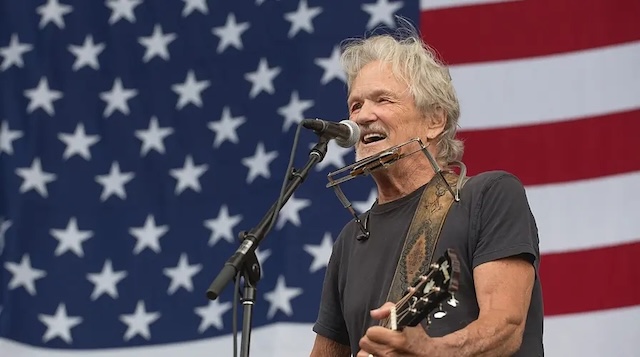
A Sensual Swagger: The Impact of “Help Me Make It Through the Night”
Kristofferson’s 1970 song “Help Me Make It Through the Night” was a game-changer in country music. Its honest portrayal of desire and intimacy was revolutionary, pushing the boundaries of what was acceptable in Nashville at the time. The song, with its silver-tongued seduction, showcased his ability to capture the rawness of human emotion. Kristofferson’s magnetic personality only added to his charm, making him a sex symbol both in person and on the big screen, as fans admired not only his musical talent but also his roguish good looks and charm.
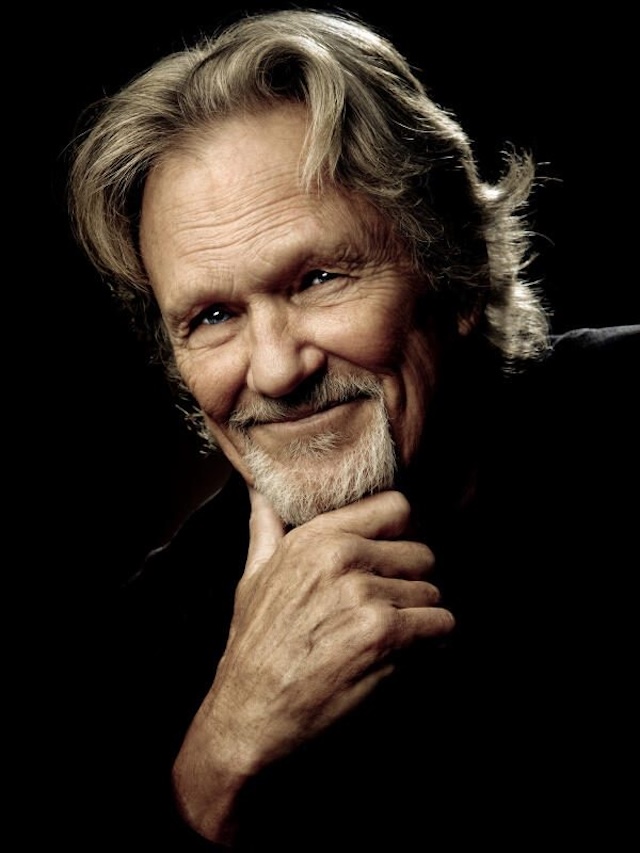
Transition to the Silver Screen
Kris Kristofferson’s talents weren’t confined to music; he also made a name for himself in Hollywood. His role opposite Barbra Streisand in the 1976 remake of A Star Is Born cemented his status as a bona fide movie star. Kristofferson’s filmography includes iconic titles such as Pat Garrett and Billy the Kid, Alice Doesn’t Live Here Anymore, and Lone Star. He worked with legendary directors like Sam Peckinpah, Martin Scorsese, and John Sayles, bringing the same authenticity and charisma to his acting roles that he brought to his music.
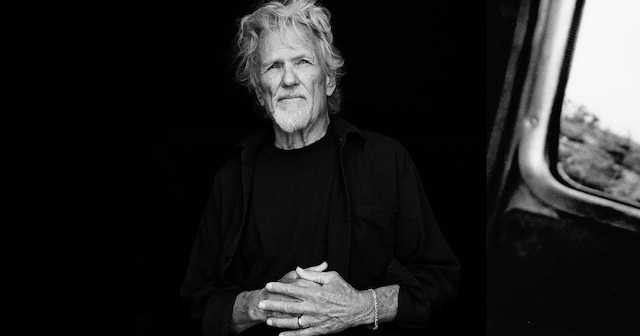
The Highwaymen and Political Activism
In the 1980s and 1990s, Kristofferson joined forces with Johnny Cash, Waylon Jennings, and Willie Nelson to form the country music supergroup The Highwaymen. Their collaboration was a celebration of the “outlaw” spirit of country music, and Kristofferson cherished the opportunity to share the stage with his idols. During this period, he also became deeply involved in political causes, opposing U.S. foreign policy in Central America and protesting nuclear testing in Nevada. Kristofferson was vocal about his beliefs, using his platform to speak out for justice and humanity.
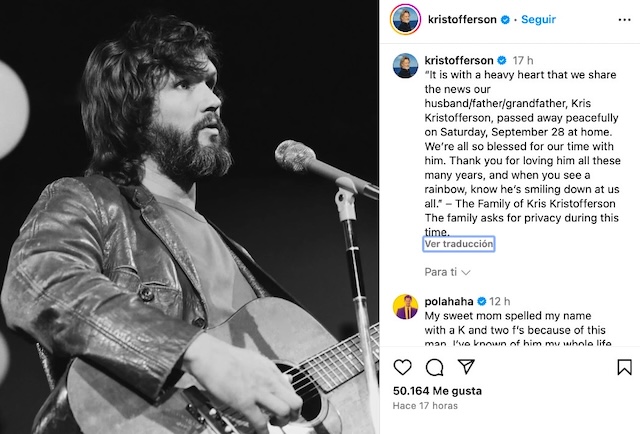
Struggles with Memory in Later Life
In his later years, Kris Kristofferson suffered from severe memory loss, which many attributed to a misdiagnosis of Alzheimer’s disease before discovering it was actually Lyme disease. Despite these challenges, Kristofferson continued to perform until 2020, connecting with his audience through the music that defined his life. Those who saw him perform in his final years described how he could still captivate a crowd with his charisma and presence. Even when he struggled to remember recent events, the music remained with him, serving as a bridge to his past and a testament to the power of his art.
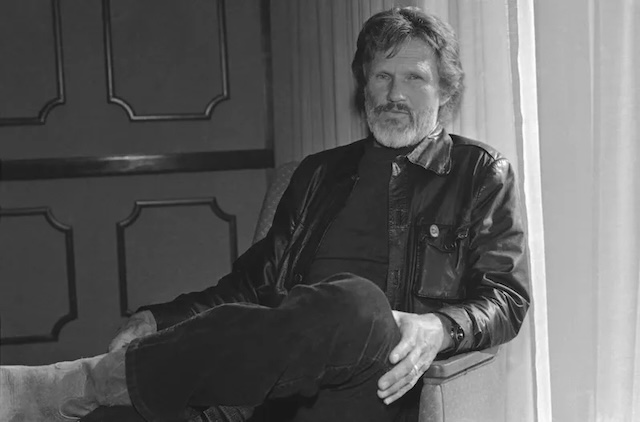
Reflections on a Life Well Lived
In a 2013 interview, Kristofferson spoke about his life with gratitude. At 76, he had just released an album aptly titled Feeling Mortal. He reflected on the incredible journey he had taken—from military officer to janitor, from a struggling songwriter to a country music icon and film star. Living in his home on Maui, high on the slopes of the Haleakala volcano, Kristofferson found peace in the life he had built. He cherished his eight children, his loving wife, and the countless experiences he had gathered along the way. As he put it, he felt blessed to have lived such a full life, filled with both triumphs and challenges.
Kris Kristofferson’s legacy lives on through his songs, his films, and the memories of those who admired him. He was a man of many talents, with an unquenchable thirst for life and an ability to touch people’s hearts with his words and performances. Though he is no longer with us, his contributions to music and film will be remembered for generations to come—a true rebel, artist, and storyteller.
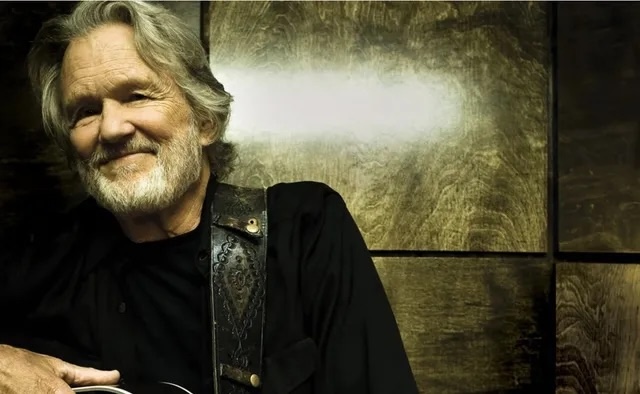
Conclusion
Kris Kristofferson’s life was a remarkable journey of creativity, resilience, and passion. From his early days in a military family to his rise as a revolutionary songwriter, Hollywood star, and outspoken activist, he left an indelible mark on both music and film. His raw storytelling and authentic presence resonated with audiences around the world, inspiring countless musicians and actors. Even in his later years, despite his health struggles, Kristofferson’s connection to his craft remained unwavering. His legacy will continue to inspire future generations—a true artist who lived on his own terms, sharing his truth through every note and every role.
